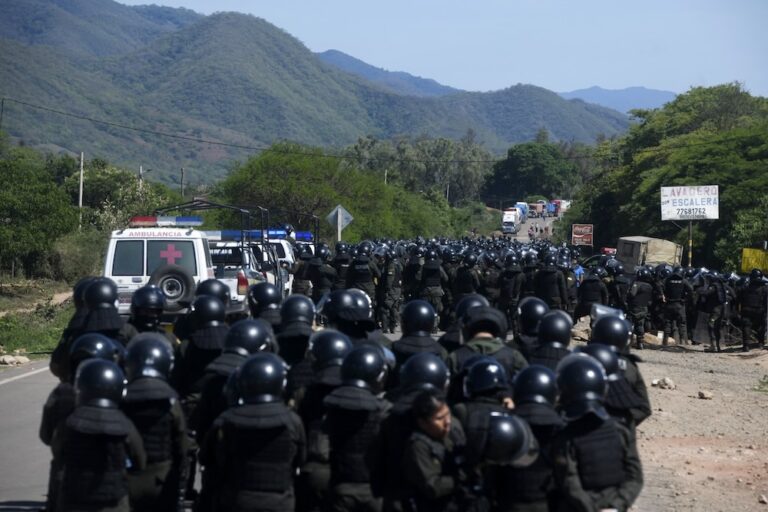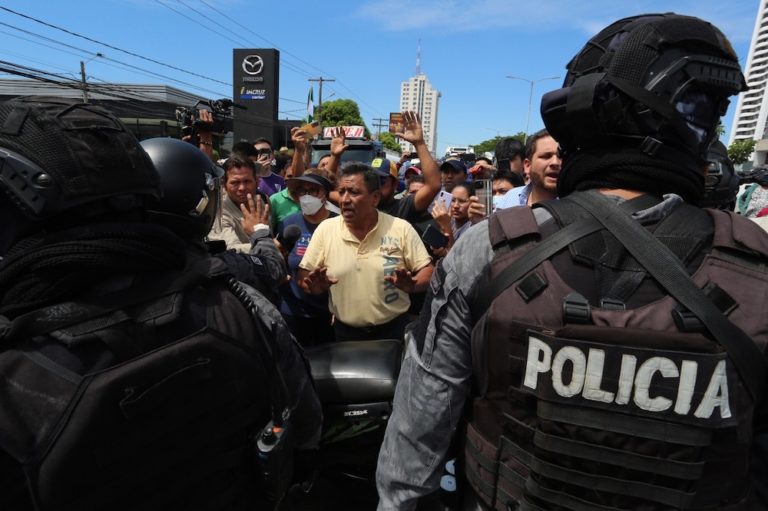(RSF/IFEX) – Reporters Without Borders calls on the government and judicial authorities to take action in response to two incidents of physical attacks by members of the Popular Civic Committee – a radical group that claims to support the government – against journalists with privately-owned and community media in La Paz on 28 and 29 […]
(RSF/IFEX) – Reporters Without Borders calls on the government and judicial authorities to take action in response to two incidents of physical attacks by members of the Popular Civic Committee – a radical group that claims to support the government – against journalists with privately-owned and community media in La Paz on 28 and 29 October 2008. Vice-President Alvaro García Linera has condemned the violence and promised an investigation.
“In op-ed pieces on 21 October in the national dailies ‘La Razón’ and ‘La Prensa’, we strongly condemned the racism and calls for the assassination of President Evo Morales voiced by anti-government radicals and certain privately owned media,” Reporters Without Borders said. “Justice must also be applied to activists claiming to support the government who incite hatred against journalists.
“The passivity shown by the police during these attacks on the press in unacceptable and the investigation promised by the vice-president must shed light on this point. Similarly, it is unacceptable that Popular Civic Committee leader Adolfo Cerrudo, who has been charged several times for violence against journalists, is carrying on as before and is violating the terms of the court control under which he was placed. We hope he will be sent back to prison and tried, just as we hope that pro-autonomy supporters will be tried for their attacks on the state media.
“Given the political agreements reached by the government and main opposition parties with a view to holding a constitutional referendum on 25 January 2009, we urge President Morales and the relevant government minister to adopt concrete measures to protect the media and to quickly hold talks with representatives of the journalism profession.”
On 29 October, some 200 Popular Civic Committee members attacked a dozen journalists who were outside San Pedro prison for the arrival of members of a commission from the Union of South American Nations (Unasur) to question the detained former governor of the northwestern department of Pando, Leopoldo Fernández, about a massacre of 15 indigenous peasants on 11 September, with which he has been charged.
Members of the “Red Ponchos” collective began by hitting the journalists with leather lashes. The attack was intensified when journalists from TV stations ATB and Red Uno set up their equipment, Reporters Without Borders was told by María Luisa Callejas of the daily “La Prensa”, who was herself attacked.
“If you do not leave, we will kick you out of here,” several of the assailants shouted, one of whom turned out to be Cerrudo, the Popular Civic Committee’s leader. Callejas said: “At no point did the police step in to disperse our assailants. They just tried to keep us at a distance.” That did not suffice to protect the journalists. The protesters charged them and in the ensuing melee, Jonnatan Condori of Catholic Church-affiliated Radio Erbol and Javier Alanota of ATB were badly beaten.
There was also violence the day before outside the prison. Popular Civic Committee members led by Edgar Mora attacked four journalists who had come to cover their protest against the former Pando governor’s possible transfer to Sucre. Reporter Roxana Lizárraga and cameraman Juan Carlos Vera of privately-owned TV station Unitel, Nicolás Sanabria of privately-owned Radio Fides and Gustavo Arévalo of ATB were all physically attacked and accused of being “paid by Leopoldo Fernández.” Some of them were forced to suspend their live transmission.
Already implicated in several cases of violence against the media in La Paz, Cerrudo threatened to rape a woman reporter with “La Razón” in March. Placed under house arrest by Judge Virginia Crespo, he managed to obtain a conditional release on 23 July by giving a written undertaking not to attack the media any more.
Bolivia was ranked 115th out of 173 countries in the press freedom index issued this month by Reporters Without Borders, 47 places lower than its ranking in last year’s index. This dramatic fall was due to the frequency of physical attacks on the media and the media’s polarisation by 10 months of political crisis.
For further information on attacks on the media by the Popular Civic Committee, see: http://ifex.org/en/content/view/full/94358
For further information on the threats made to the “La Razon” journalist, see: http://ifex.org/en/content/view/full/91608


